A long-standing independent report on the health of the U.S. Navy is set to end this year unless Congress acts, USNI News has learned.
The Board of Inspection and Survey (INSURV), founded under Battle of Mobile winner Adm. David Farragut in 1868 and cemented into law by Congress in 1882, is in charge of assessing ship readiness. The inspection body this month released its latest report, which could be the last one under current law.
While INSURV has existed for 139 years for the purpose of examining the service’s ships, Congress included a provision in the Fiscal Year 2019 National Defense Authorization Act stipulating that a report would no longer be required after Oct. 1, 2021 – meaning last week’s assessment could be the last.
The reports have long been a headache for the Navy because they often paint an unfavorable picture of the fleet’s readiness. The assessment for FY 2020 – unveiled last week – found that ship readiness decreased in the last three years. A string of negative INSURV reports prompted the Navy to classify the assessments in 2008, but the service later began producing unclassified versions of the reports.
“That report made its way through various offices and in some cases, in most cases for the surface fleet, the reports were not very flattering because those ships were run hard,” retired Rear Adm. Sam Perez, who led the Board of Inspection and Survey from 2015 to 2016, told USNI News. “And sailors didn’t have the assets and the resources to fix their ships.”
But Perez argues the reports are vital to understanding the Navy’s fleet readiness and monitoring trends across time. Without INSURV, he noted there is no independent report assessing ship readiness.
“That report – across all the figures of merit, supply, engineering, combat systems, all of those things – you could track which ones were doing well, which ones were doing better, and you track trends. So I think it was a phenomenally useful tool,” Perez said.
“Now, as a ship captain, did I look forward to conducting an INSURV? Absolutely not,” he continued. “But as a fleet manager, and someone who’s looking at how to prioritize money for the maintenance of the fleet, I think that INSURV tool was phenomenally beneficial.”
Lawmakers cited two reasons the INSURV report sundown provision made its way into the policy bill: an effort to reduce the number of reports that are conducted in perpetuity, and concern from the Navy that the evaluations exposed information to U.S. adversaries.
But several lawmakers on the House Armed Services Committee recently told USNI News they believe the report is crucial and that the panel should work to reverse the provision ending its requirement.
Rep. Elaine Luria (D-Va.), a former Navy nuclear-qualified surface warfare officer whose district includes portions of Norfolk, Va., said the INSURV reports are “critical” to lawmakers’ work and should remain unclassified for the public.
“I think that the transparency is really important, and I also think that the report should not be classified,” Luria told USNI News. “I think that the taxpayers need to understand how the Navy’s being maintained, how their tax dollars are being used and what the readiness of our Navy is for our national defense.”
Luria also said the board should perform the surveys without notice, so inspectors can get an accurate view of the ship’s readiness.
“Having lived through this process, I think that when ships know their INSURV date years out, that gives them a lot of time that might not be a true snapshot of their readiness because they’ve solely focused on the upcoming inspection and you might get sort of inflated results because there’s been so much effort put into making sure that they do well on the inspection,” Luria said. “Yet what we really want is like a snapshot: if you’re going to walk on the ship today, where are we?”
Read full article>>>

